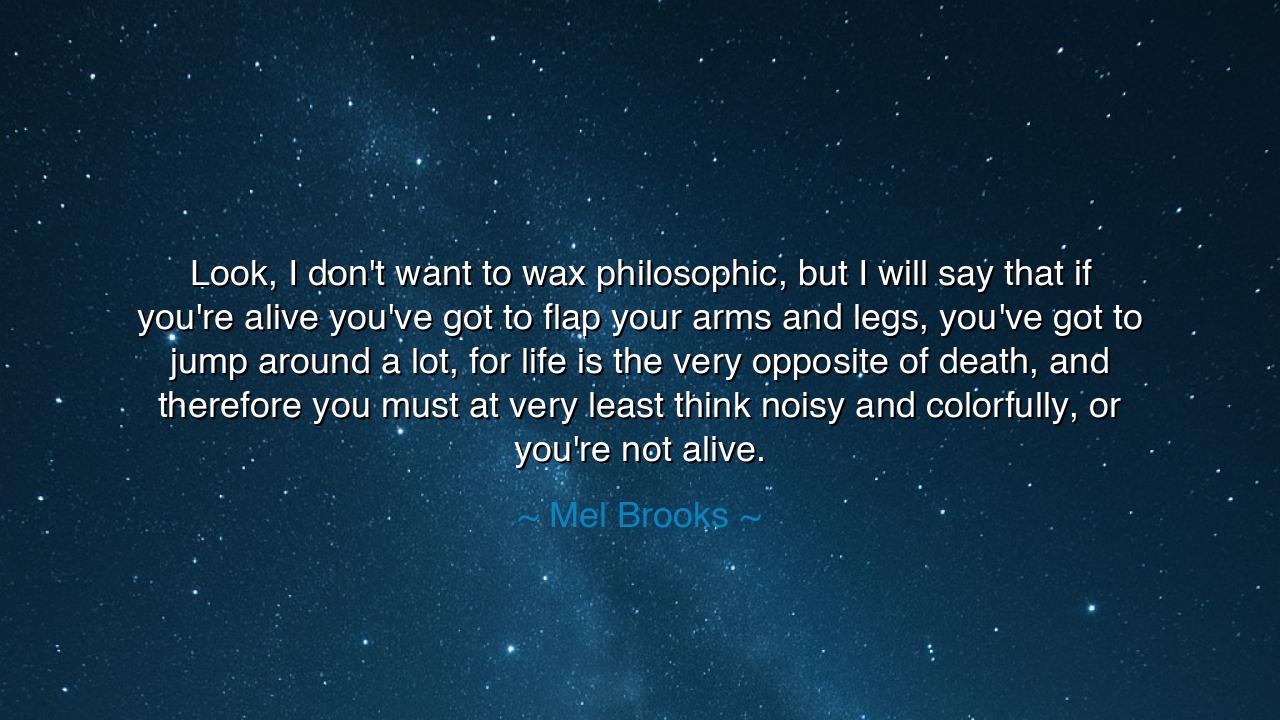
Look, I don't want to wax philosophic, but I will say that if
Look, I don't want to wax philosophic, but I will say that if you're alive you've got to flap your arms and legs, you've got to jump around a lot, for life is the very opposite of death, and therefore you must at very least think noisy and colorfully, or you're not alive.






“Look, I don’t want to wax philosophic, but I will say that if you’re alive you’ve got to flap your arms and legs, you’ve got to jump around a lot, for life is the very opposite of death, and therefore you must at very least think noisy and colorfully, or you’re not alive.” Thus spoke Mel Brooks, the jester-sage of our age — a man who cloaked his wisdom in laughter, who turned the absurdities of existence into a hymn of survival. Though he utters these words in humor, they pulse with a deeper truth: that to live is to move, to create, to dare, to shout back at the silence of the grave. Life, Brooks reminds us, is not a passive condition but an act of rebellion — a defiant dance against the stillness that waits for all.
Brooks, who survived hardship and tragedy before becoming one of comedy’s great architects, understood that humor itself is a form of vital energy — a way of breathing life into despair. In his words, the act of “flapping your arms and legs” becomes a metaphor for participation in existence. It is not enough to simply breathe; one must engage, one must stir the air, one must be loud, clumsy, joyful, and unashamed in the pursuit of meaning. For to stand still in spirit, to surrender to routine and resignation, is to let the slow frost of death creep upon the living. Life, therefore, demands noise — not chaos, but the sound of motion, of presence, of being truly awake.
In this sense, Brooks speaks the same truth as the ancients. The philosopher Heraclitus declared that “life is motion,” that all things exist in the flux of becoming. The stagnant pond breeds decay, but the flowing river renews itself forever. Brooks, in his jesting way, repeats this eternal law: movement is life. When he urges us to “think noisy and colorfully,” he is not merely advocating eccentricity — he is calling for vital imagination, for the courage to think vividly, to reject the gray monotony that numbs the human heart. The mind that dares to color outside its lines, that dreams in bright tones and unrestrained laughter, is the mind that remains truly alive.
Consider the story of Robin Williams, another master of comedy whose spirit seemed to overflow with Brooks’s philosophy. Williams did not whisper his existence; he lived it at full volume — leaping, improvising, burning like a comet of feeling and wit. His humor was a balm for the broken, his voice a roar against despair. Even amid his private battles, he embodied this truth: that to live fully is to give oneself entirely to the world’s great pageant, even when it hurts. Like Brooks, he understood that laughter is not the denial of pain, but the transformation of it into light. To “think noisy and colorfully” is, in essence, to transmute suffering into song.
There is a sacred defiance in such an attitude. The stillness of death — both literal and spiritual — is always near, creeping into lives lived without wonder or daring. To counter it, one must create movement: in thought, in action, in love. Even in the smallest gestures — a kind word, a bold idea, an act of kindness — we flap our wings against the pull of stillness. Life, as Brooks proclaims, is not quiet. It beats, laughs, protests, and dreams. It is not polite, but passionate; not silent, but singing. To live otherwise is to betray the very miracle of existence.
And yet, there is humility in Brooks’s humor. He admits, “I don’t want to wax philosophic,” as though to say that wisdom need not wear the solemn mask of sages. For true wisdom is not distant or austere — it is human, earthy, alive. His teaching is not that one must become perfect or profound, but that one must simply participate: jump, think, feel, err, and rise again. The measure of a life is not its neatness, but its vitality. Better to stumble while dancing than to stand forever still.
Therefore, my child, take these words as both challenge and blessing. Do not drift through your days in quiet resignation. Laugh loudly. Think boldly. Move toward what fills you with wonder. Paint your existence with color, even if the world prefers gray. Be unafraid of making noise — the noise of love, of creativity, of honest emotion. For every shout, every laugh, every act of courage is an affirmation that you are alive, and that death has not yet claimed you.
And when weariness comes — as it must — remember Mel Brooks’s wisdom: that life is not meant to be perfect or polite, but vibrant. It is the act of stirring the air, of flapping one’s arms against the darkness, of declaring, “I am here!” Live, then, as the ancients would have admired — not quietly fading, but blazing and laughing to the end. For in every moment you dare to move, to imagine, to love, you turn existence itself into art — and in doing so, you become immortal in spirit, forever alive in the palace of noise and color that is life.






AAdministratorAdministrator
Welcome, honored guests. Please leave a comment, we will respond soon